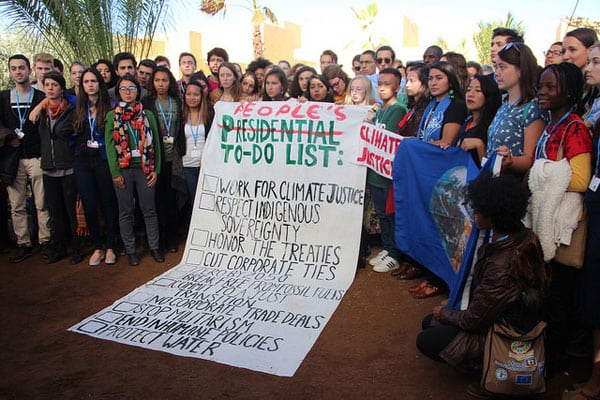
September 4, 2018; Indian Country Today
In 2017, NPQ reported that 2016 was the deadliest year for indigenous activists; in the end, 2017 surpassed even that. With large-scale projects promising heaping profits, the alarming trend of the murder, persecution, and criminalization of indigenous peoples continues to rise, as indicated in the latest report by the UN Special Rapporteur on the Rights of Indigenous Peoples, Victoria Tauli-Corpuz. NPQ readers are encouraged to read the full report, as Tauli-Corpuz explains the crisis and its root causes in detail.
According to the report, the basis for these attacks lies in “the intensified competition over natural resources led by private companies, at times with government complicity” which “has placed indigenous communities seeking to protect their traditional lands at the forefront as targets of persecution.” Tauli-Corpuz explains:
Instances of criminalization and violence arises, in most cases, when indigenous leaders and community members voice opposition to large projects relating to extractive industries, agribusiness, infrastructure, hydroelectric dams and logging. In other instances, indigenous peoples’ ways of life and subsistence are deemed illegal or incompatible with conservation policies, leading to the prohibition of indigenous traditional livelihoods and the arrest, detention, forced eviction and violations of other human rights of indigenous peoples.
Sign up for our free newsletters
Subscribe to NPQ's newsletters to have our top stories delivered directly to your inbox.
By signing up, you agree to our privacy policy and terms of use, and to receive messages from NPQ and our partners.
Because of this, most of 2017’s attacks and transgressions took place in resource-rich countries such as Brazil, Colombia, Mexico, and the Philippines. However, we also saw human rights violations unfold in our own backyard with the Standing Rock Sioux Reservation and the Dakota Access Pipeline. Moreover, this is not a new phenomenon. NPQ has been reporting on these human rights violations since at least 2014, covering the murders of high-profile indigenous activists in both Peru and Honduras.
At first glance, it seems impossible that so many people are killed each year without these stories receiving more attention. Global Witness reported that 207 murders of environmental defenders took place just in 2017. Yet, a deeper look into this system reveals that the killings take place within a framework of arrests based on “trumped-up charges,” smear campaigns against native communities, “undue legal prosecution,” and increasing militarization. Entire indigenous communities have been labeled terrorists or thugs, even when they are just exercising their right to peaceful protest.
The horror of murder is easier to grasp, but the other human rights violations must not be dismissed. Years of legal proceedings have an enormous economic impact on the families involved, not to mention the mental and emotional fatigue resulting from fighting arbitrary arrests. Smear campaigns labelling indigenous leaders as criminals contribute to the systemic racism these communities face and make it more difficult for indigenous communities to receive aid. Moreover, the danger associated with indigenous activism undoubtedly hinders their ability to recruit help and support.
That this situation is dire goes without saying. In her report, however, Tauli-Corpuz lays out a handful of recommendations, two of which occur at the government level and must be enacted if we are to ever put an end to this crisis. First, governments must adopt a “zero-tolerance approach to the killing and violence of indigenous human rights defenders.” Secondly, governments must publicly support indigenous communities and their rights. This support goes beyond merely mouthing words to working with indigenous peoples to get their “free, prior and informed consent” on projects affecting their land or their traditions. The government must make it their mission to protect the welfare of all their people—including indigenous communities.— Sheela Nimishakavi













